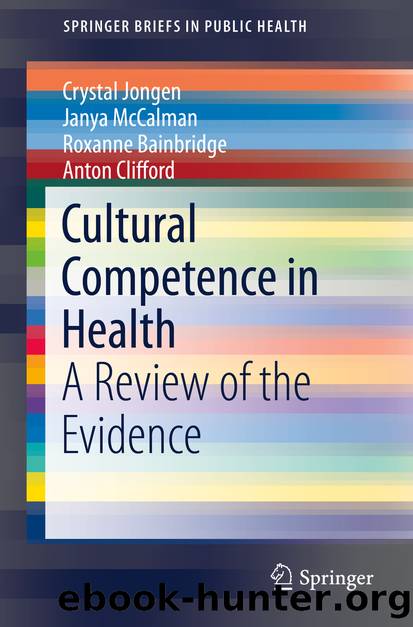Cultural Competence in Health by Crystal Jongen Janya McCalman Roxanne Bainbridge & Anton Clifford

Author:Crystal Jongen, Janya McCalman, Roxanne Bainbridge & Anton Clifford
Language: eng
Format: epub
Publisher: Springer Singapore, Singapore
5.3.2 Cultural Immersion
Many of the challenges to improving health outcomes for Indigenous and ethnic minority populations relate to a lack of understanding among healthcare professionals of the contexts in which these populations live and the impacts of these contexts on healthcare outcomes [22]. Cultural immersion is one strategy which can help professionals better understand peoples’ social contexts. Four studies employed cultural immersion as the main intervention strategy [24–27].
Cultural immersion strategies included two or more of the following components: education sessions, clinical placements and/or a community experience. The duration of cultural immersion programs ranged from one and a half to five days. The content commonly delivered by the educational component of cultural immersion programs targeted participants’ cultural knowledge and awareness. Clinical placement and community experience components of immersion strategies targeted students’ attitudes to Indigenous peoples, confidence to interact with Indigenous people and their perceptions of the cultural immersion experience.
Consistent with the experiential focus of cultural immersion, evaluations of this strategy primarily assessed participants’ experiences and perceptions using qualitative methods. Two out of the four cultural immersion studies assessed pre-post changes in measured outcomes [24, 26]. Improvements in measures related to students’ attitudes towards Indigenous people [24] interacting with Indigenous people and providing culturally competent healthcare [26] were reported. The other two studies conducted a post-test of students’ perceptions of and/or satisfaction with the cultural immersion experience [25, 27]. Future evaluations could be strengthened by including outcome measures more closely linked to the primary rationales for implementing cultural immersion programs in health and medical curricula. These include increasing the number of health professionals who are culturally competent and/or willing to work with Indigenous and other ethnic minority populations and the ensuing impact of these increases on healthcare and health outcomes of Indigenous and other ethnic minority populations [21, 25].
Case Study 2: Cultural Immersion
Bennett et al. [26] evaluated the effect of a 4–8-week structured and educational clinical placement program on undergraduate nursing students’ confidence in areas of primary healthcare delivery and culturally knowledgeable practice. The program included a 5-day orientation to develop nurses’ skills, knowledge and attitudes relating to Indigenous health and primary healthcare followed by an extended clinical placement to consolidate learnings and establish Indigenous and non-Indigenous relationships and networks. The study was evaluated using a pre-post single-group design. Nursing students’ confidence to communicate effectively with Indigenous clients, provide culturally appropriate care, understand the needs of Indigenous clients and ask Indigenous clients questions about their healthcare needs was assessed using confidence logs self-completed before and after their placement and at a 3-month post-placement phone interview. Focus groups were also conducted as a debriefing session. All 31 undergraduate nursing students’ completed the evaluation. All confidence domains increased at post assessment, with the greatest increase observed for nurses’ confidence in understanding the needs of Indigenous clients, followed by asking Indigenous people questions about their healthcare. Focus groups identified salient themes related to nursing students’ increased confidence to relate to Indigenous people, understanding of the complexity of Indigenous healthcare and how to effectively work in the Indigenous community.
Download
This site does not store any files on its server. We only index and link to content provided by other sites. Please contact the content providers to delete copyright contents if any and email us, we'll remove relevant links or contents immediately.
Good by S. Walden(3560)
The Social Psychology of Inequality by Unknown(3031)
The Checklist Manifesto by Atul Gawande(2855)
0041152001443424520 .pdf by Unknown(2846)
Get What's Yours for Medicare: Maximize Your Coverage, Minimize Your Costs by Philip Moeller(2742)
The Meaning of the Library by unknow(2573)
Guns, Germs and Steel by Diamond Jared(2372)
Borders by unknow(2315)
23:27 by H. L. Roberts(2252)
And the Band Played On by Randy Shilts(2210)
Being Mortal: Medicine and What Matters in the End by Atul Gawande(2129)
A Leg to Stand On by Oliver Sacks(2040)
The Hot Zone by Richard Preston(2020)
More Than Words (Sweet Lady Kisses) by Helen West(1867)
The Valachi Papers by Peter Maas(1861)
The Laws of Medicine by Siddhartha Mukherjee(1803)
The Andromeda Strain by Michael Crichton(1747)
Get What's Yours for Medicare by Philip Moeller(1746)
The Obesity Epidemic by Robyn Toomath(1676)
